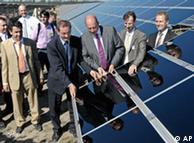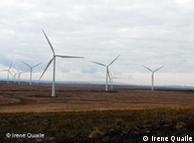In the midst of an ongoing debate over whether to extend the
lifespan of Germany's 17 nuclear power plants, a new report has revealed
that the continued availability of nuclear power would likely cause a
decrease in investment into renewable energies.
Increases in wind and solar energy capacities will eventually lead to
nuclear power plants being used less, the report states. The reason:
energy from renewable sources enjoys legal priority over nuclear and
coal power. It is fed into the grid before electricity from
non-renewable sources.
As the capacity of electricity from wind or solar sources increases,
conventional electricity sources will only be needed to fill in gaps
when there is a lack of wind or sun. But it takes about 50 hours to
restart a nuclear power plant that has been completely shut down,
meaning it would be necessary to keep the plant running at 50 or 60
percent capacity.
Gas powered turbines, however, can be turned on within 20 minutes and
can also be run on biogas. Other possibilities to bridge fluctuations
in renewable electricity output include the decentralized approach of
using micro-power stations or accessing the batteries of electric cars.
Companies likely to fight
 Bildunterschrift: Großansicht des Bildes mit der Bildunterschrift: Conventional power might only be needed when the wind isn't blowingGermany's
four largest energy companies - E.ON, RWE, Vattenfall and EnBW - will
do everything in their power to avoid losing billions on their
investments into nuclear power, the report assumes.
Bildunterschrift: Großansicht des Bildes mit der Bildunterschrift: Conventional power might only be needed when the wind isn't blowingGermany's
four largest energy companies - E.ON, RWE, Vattenfall and EnBW - will
do everything in their power to avoid losing billions on their
investments into nuclear power, the report assumes.
Supposing the lifespans of the power plant are increased by 28 years,
energy companies will have to come to terms with turning them off some
15,800 times between 2020 and the date when the last plant is shut down.
That would cost them between 21 and 80 billion euros ($26.7 billion
to $101.7 billion), unless they successfully lobby to overturn the
priority that electricity from renewable sources enjoys and pushed for
the construction of those sources to be capped.
Gero Lucking, of the renewable energy company LichtBlick, which
sponsored the study, described the dilemma as the "largest post-war
economic dispute" in Germany.
Olav Hohmeyer, professor of economics and energy and environmental
management at the University of Flensburg, authored the study. According
to Hohmeyer, electricity needs can entirely be met through renewable
energy sources by 2050. Nuclear power plant lifespans will not need to
be extended, nor will there be an electricity deficit to be covered by
new coal-fired power plants.
"Nuclear power plants are not flexible enough to safely react to
changing weather conditions and compensate for fluctuations in wind and
sunshine," Hohmeyer said.
Hohmeyer's report states the last nuclear power plant can be removed
from the grid in 2023 and the last coal-fired power plant in 2046.
Extending the lifespans of nuclear power plants by 40 years in Germany -
as has been proposed by the government - would damage vital investment
interests and set back the switch to renewable energy by decades.
 Bildunterschrift: Großansicht des Bildes mit der Bildunterschrift: Increased renewable energy could curb the need for nuclear energy
Bildunterschrift: Großansicht des Bildes mit der Bildunterschrift: Increased renewable energy could curb the need for nuclear energy
Monopoly-like structures
Florian Noto of the German Nature Conservancy represents a group of
21 environmental organizations banded together against nuclear energy.
He said an already-permitted nuclear power plant can generate
inexpensive electricity for energy companies, when nuclear waste,
risk-based costs and insurance are not taken into account.
"A newly-constructed eco-power plant can't necessarily keep up," he
told Deutsche Welle. "If the old nuclear power plants just keep running,
then progress won't be made and little will be invested […] it would
actually lead to an investment bottleneck."
Noto also pointed out that four of the 17 nuclear power plants in
Germany were out of commission for more than 10 months during 2009, and
that at times as many as eight of them were out of commission.
A more diverse and decentralized energy market could lead to lower electricity prices for consumers, according to Noto.
"The fact is these companies are actually too dominant, and an
economic counterweight needs to be created. If more new energy companies
join this market - if the market is expanded - then that will lead to
these monopolistic structures going away," he said.
Electricity from renewable sources will become less expensive in
comparison to conventionally generated electricity as prices of raw
materials rise, the report states. By 2050 its additional monthly price
compared to conventionally generated electricity could be between
just three and 17 euros for an average household using 3,000 kilowatt
hours.
Author: Gerhard Schneibel
Editor: John Blau
http://www.dw-world.de/dw/article/0,,5944233,00.html









